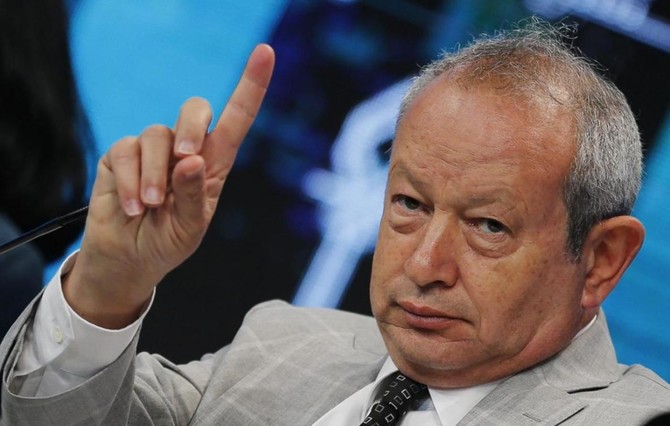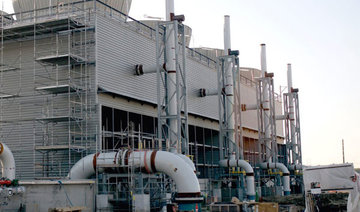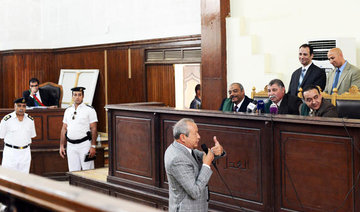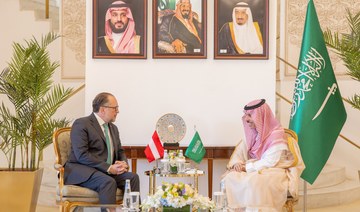LONDON: La Mancha Holding, the mining investment vehicle headed by Naguib Sawiris, is looking at more gold acquisitions in Africa, Arab News can reveal.
In June, the private, Luxembourg-headquartered company headed by the billionaire Egyptian businessman shelled out $126 million for a 30 percent stake in Toronto-listed Golden Star, owner of two gold mines in Ghana. La Mancha already owns 30 percent of another gold company, Endeavour Mining with gold assets in West Africa. It also has significant stake in Australian gold miner Evolution.
But Africa appears to be the main target, for now. La Mancha’s new chief financial officer, Beirut-born Karim-Michel Nasr said: “We are interested in M&A, although we are not empire builders — our aim is to build shareholder value, any acquisition has to be value accretive.”
The company would look at potential mining targets in west and central Africa but “not southern Africa,” said Nasr.
Andrew Breichmanas, mining analyst at BMO Capital Markets, said that, given Sawiris’ track record in bolstering the value of Endeavour and Evolution, “there is every reason to be bullish about [his] strategy going forward. Sawiris is viewed as a successful operator,” he said.
The market worth of Endeavour and Evolution since he bought into them in 2015 had rocketed by 290 percent and 267 percent respectively, according to a La Mancha presentation on its website.
Sawiris, reckoned to be worth almost $4 billion by Forbes, has the financial firepower to allow Golden Star or La Mancha itself to go out and do other deals,” said Breichmanas.
La Mancha’s approach to date has been to inject both cash and assets into new investments, “improving the scale of those assets, and trading off [selling] those at the bottom of the quality curve,” Jonathan Guy, an analyst at Numis Securities, said in an interview with Mining Journal this week.
Half of Sawiris’s personal net worth is today locked into gold company investments, the Egyptian recently told Fox News. Gold mining companies had underperformed the gold price by a significant margin this year, down 27 percent according to the New York Arca Gold Bugs index, against the metal’s 9 percent slide. And that meant Sawiris could see the opportunity to pick up undervalued mining assets.
Breichmanas backed that general drift, saying: “If you look at valuations for gold companies they are relatively attractive as they trade at a discount to the prevailing gold price. So, you could certainly make the case that there is value within the sector.”
Gold M&A is being propelled during a period when there is relatively little new supply coming on stream, and companies view mergers as the easiest and quickest way to expand their asset portfolios. Executives see tie-ups as less risky and less costly than developing new mines, sometimes in challenging geographies. Last week, one of the biggest gold mergers of recent years was cemented when Barrick Gold of Canada unveiled an agreed takeover of Randgold, which runs gold mines in Africa, sometimes in tricky jurisdictions such as Mali and Cote D’Ivoire.
Sawiris told Fox: “I invest in gold mining companies because the cost per ounce has a 30 to 40 percent discount when you mine it yourself versus the international (gold) price, so there is a cushion there.”
He added: “In the last few years, there haven’t been any big findings in gold or copper anywhere in the world … I mean significant ones. That means down the road, there will be higher prices.”
He likes gold (and also copper) for other reasons — as a hedge against inflation and as a buffer in the face of current geopolitical uncertainty.
By underwriting expansion, as well as bringing in accomplished mine managers to acquired investments, such as Sebastien de Montessus, CEO and president of Endeavour, Sawiris had shown himself to be “a shrewd and accomplished operator,” said Guy at Numis.
La Mancha has beefed up its profile this year. In January Sawiris brought in Andrew Wray, the former finance director of London-listed Acacia Mining (which owns gold mines in Tanzania) to be his CEO. Sawiris has also put Wray on the board of Golden Star. And he recruited Nasr, who worked with him in the Middle East for 20 years as he built up his North Africa-Asia telecoms empire (Orascom), which was eventually sold to the Russians.
Egyptian ‘Goldfinger’ targets African expansion
Egyptian ‘Goldfinger’ targets African expansion

- Sawiris is estimated to be worth $4 billion by Forbes
- Sees attractive valuations in African gold mining assets
Saudi minister discusses logistics cooperation on visit to Port of Rotterdam

- Discussions touched on encouraging Dutch infrastructure investments for metal processing in the Kingdom
AMSTERDAM: Saudi Arabia’s Minister of Industry and Mineral Resources, Bandar Ibrahim Alkhorayef, paid a visit to the Port of Rotterdam, where he discussed with the port authority ways to enhance cooperation in logistics services.
Opportunities provided by the Kingdom in this sector, the role that the Kingdom can play as a strategic supplier of vital minerals, and how to enhance the flexibility of global supply chains, leveraging the Kingdom’s position as a bridge between East and West were discussed.
The meeting with port officials also explored avenues for enhancing cooperation with Dutch companies in various fields, including developing processing and recycling capabilities in both countries, benefiting from Dutch expertise and technology.
Additionally, discussions touched on encouraging Dutch infrastructure investments for metal processing in the Kingdom to achieve the aspirations of both countries in developing the sector.
Alkhorayef reviewed the objectives of the National Industrial Development and Logistics Program (NIDLP), a program under Saudi Vision 2030, which focuses on investing in the Kingdom’s unique strategic location linking three continents and transforming it into a leading industrial power and global logistics center.
The minister also toured the port’s FutureLand area, where he was briefed on the various maritime services provided to ships and shipping companies, including towing, docking, repairs, shipbuilding, and ship supply.
Saudi Arabia and Austria sign MoU for economic cooperation

VIENNA: Saudi Arabia’s economy ministry and its Austrian counterpart signed a memorandum of understanding to boost economic cooperation between the two nations.
The Saudi Ministry of Economy and Planning Austria’s Ministry of Labor and Economy in the deal on the sidelines of the Saudi-Austrian Joint Committee held in the Austrian capital.
The MoU was signed by the Saudi Minister of Economy and Planning Faisal bin Fadel Al-Ibrahim, and the Austrian Minister of Labor and Economy, Martin Kocher.
The MoU aims to diversify and strengthen economic ties, exchange experiences and information, and encourage cooperation in a number of fields, including trade, industry, research and development, tourism, small and medium enterprises.
Among the content of the MoU is the organization of conferences, seminars and the exchange of visits between experts, in addition to cooperation between government institutions and the private sector.
The parties are also committed to protecting intellectual property rights and exchanging information for the purposes specified in the MoU.
This MoU comes within the framework of a cooperation agreement in the economic, commercial, industrial and technical fields signed between the two governments in 2004.
Xi calls for more jobs for youth, migrant workers

- (We should) insist that employment of young people including college graduates is a top priority: Chinese president
BEIJING: China’s President Xi Jinping called on Monday for efforts to promote high-quality and sufficient jobs for college graduates and migrant workers, while presiding over a Politburo group study session, state media Xinhua reported on Tuesday.
“(We should) insist that employment of young people including college graduates is a top priority,” the Xinhua report quoted Xi as saying at a group study session of the Politburo, a top decision-making body of the ruling Communist Party.
The Xinhua report did not give details on job promotion support measures or plans.
The survey-based jobless rate for 16-24 year-olds, excluding college students, was 14.7 percent in April, down from 15.3 percent in March, official data showed last week.
China’s statistics bureau revised its methodology by removing college students from the survey pool after youth jobless rate surged to around 20 percent last year.
Xi also said the government should take steps to promote the employment of migrant workers, guide them to return to their hometowns and for people to start businesses in the countryside.
He called for stabilizing the income of people who had been lifted out of poverty and preventing large-scale return to poverty due to unemployment, Xinhua said.
Companies and industries with strong job creation capabilities will be supported, the report said.
China created 4.36 million new urban jobs in the first four months, Human Resources Ministry data showed, 36 percent of its annual job creation target.
Saudis spent more money on electronic devices during the 4th week of May: SAMA data

RIYADH: Saudi Arabia’s point-of-sale spending reached SR11.2 billion ($2.98 billion) in the fourth week of May, official figures showed.
The latest data from the Saudi Central Bank, also known as SAMA, revealed that spending on electronic and electric devices surged by 9.5 percent to reach SR240.4 million.
Beverages and food, which accounts for the largest share at 14.9 percent, saw a 5.9 percent decline, reaching SR1.66 billion, during the week from May 19 to 25.
Meanwhile, transactions at restaurants and cafes, holding a 14.6 percent share, recorded a slower decline of 4.8 percent, amounting to SR1.64 billion.
Saudi spending on miscellaneous goods and services, including personal care items, supplies, maintenance, and cleaning, constituted the third-highest share and witnessed a 5.1 percent decline that week, reaching SR1.36 billion.
Despite composing only 1 percent of the week’s overall POS value, spending on education recorded a minimal increase of 0.1 percent to SR152.48 million.
In the past few years, this sector has been allocated the largest share of government expenditure in comparison to other divisions of the economy.
Efforts are underway to revamp the education system, aiming to equip the national workforce with the necessary skills to thrive in a technological and information-centric global economy.
The hotel sector experienced the largest decline in POS transaction value, dropping 10.9 percent to SR227.13 million.
According to data from SAMA, 35.44 percent of POS spending occurred in Riyadh, with the total transaction value reaching SR3.97 billion. However, this represents a 1.6 percent decrease from the previous week.
Riyadh has undergone considerable expansion, evolving into a pivotal center for growth and progress. The city is witnessing a surge in new businesses setting up operations, drawn by its vibrant economic landscape and strategic prospects for investment and innovation.
Spending in Jeddah followed closely, accounting for 14.3 percent of the total and reaching SR1.60 billion; however, it marked a 3.1 percent weekly drop.
The two cities that registered the highest declines in POS spending were Makkah and Madinah, with decreases of 11 percent and 6.8 percent, respectively. The value of transactions in Makkah reached SR380.98 million, while in Madinah, it was SR393.26 million.
Saudi healthcare to advance with major digital tech partnership

RIYADH: The Saudi healthcare system is set to advance as two of the country’s major companies partner to leverage digital technologies to enhance the Kingdom’s capabilities.
SAMI Advanced Electronics Co., a wholly owned subsidiary of SAMI, the nation’s defense and digital solutions provider, has signed a cooperation agreement with the National Unified Procurement Co., a Public Investment Fund company.
The agreement, signed on May 27, will provide solutions for medication tracking and IT infrastructure and increase local content through medical devices manufacturing and maintenance.
This partnership demonstrates SAMI-AEC’s unremitting efforts to build a harmonious and applicable healthcare system in Saudi Arabia based on digital technologies.
Ziad Al-Musallam, CEO of SAMI-AEC, commented on the agreement, saying that they are honored to collaborate with NUPCO, as this deal underscores the unwavering commitment of both entities to bolstering efforts aimed at enhancing the healthcare ecosystem in Saudi Arabia.
“At SAMI-AEC, we firmly believe in the significance of augmenting public health services through digital solutions and delivering e-health services. This involves integrating effective, fast technologies to empower the healthcare sector, aligning with the objectives of Saudi Vision 2030,” he said.
Fahad Al-Shebel, CEO of NUPCO, highlighted the agreement’s importance and its role in fortifying the healthcare infrastructure and facilitating access to the integrated technology offered by SAMI-Advanced Electronics Co.
Aiming to upgrade the healthcare sector by improving its facilities in all public hospitals and medical centers in the Kingdom, NUPCO is the country’s largest central company providing medical purchasing, storage, and distribution services for medicines, devices, and supplies.
With a workforce of over 3,320 individuals, 85 percent of whom are Saudi nationals, SAMI-AEC has positioned itself as a leader in electronics, technology, engineering, and manufacturing. Its services span sectors such as defense and aerospace, digital, energy, and security.
Over 800 of the company’s employees are engineers and certified experts, reaffirming the dedication of SAMI-AEC, which was established in 1988, to excellence and innovation.
On the other hand, NUPCO was established in 2009 with SR1.5 billion in capital. It is the leading company in Saudi Arabia in procurement, logistics, and supply chain management for pharmaceuticals, medical devices, and supplies for governmental hospitals.

















